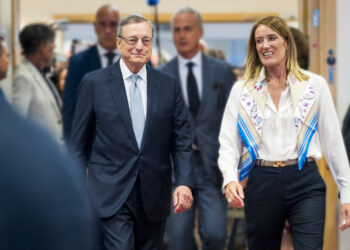They are two outstanding exes, one almost young and one nearly old: two former Italian prime ministers from whom the European Union has asked for advice on how to overcome the current crisis and relaunch itself in the coming years. Enrico Letta and Mario Draghi have been working for months on two reports, one on the Single Market and one on competitiveness, on which they are to report to the heads of state and government and the commission so that they will have material for reflection on how to get out of the shallows, primarily economic, in which the EU ship is in danger of running aground. The former was tasked by the European Council, the latter by the commission, but the product of their work will be for everyone. And it is a different product, of course, but a highly coordinated one, as far as we can tell from the anticipations that the authors themselves have made in recent days.
Letta is due at the European Council on Thursday; Draghi will go at the end of June, but the picture drawn by the two appointees mostly coincides, as do their solutions. The two have known each other for some time and have obviously been talking to each other during this period, intending to present, as Letta summarized recently when talking about his report, “a product that is politically usable.”
Draghi spoke about this today at an event in Brussels and explained that it is necessary to intervene soon and in a profound way with “a radical change,” not least because “we cannot afford the luxury of waiting for a change in the Treaties.” Letta, a few days ago, also in Brussels at another event, had said that “my report will convey a dramatic sense of urgency, inaction is no longer an answer, let’s avoid taking ‘baby steps’.” The assumptions are on point. So are they when Letta explains that “we need big players,” while Draghi says that “fragmentation is holding us back,” so what he proposes in his report “is a radical change because that is what we need. Ultimately, we will have to achieve the transformation of the entire European economy.” In short, we need to scale up, and the sectors on which both insist are telecommunications, energy, capital, and defence. As Letta puts it, citing the United States to which Draghi also often refers, “there the single market works, while ours still has difficulties, fragmentation… we have to invent a European industrial policy.”
Then, if Letta says that “interconnections are the issue on which I will put the most emphasis,” Draghi responds that “there are several bottlenecks in the European economy where lack of coordination causes investment to be inefficient. Energy networks, and in particular interconnections, are an example of this. This is clearly a public good, as an integrated energy market would reduce energy costs for our businesses and make us more resilient in the face of future crises—something the commission is pursuing in the context of REPowerEU.”
There is the problem of who pays, and the answer, again, is similar: public money is not enough, it takes private money. “… private investment will have to cover most of the investment gap,” Draghi says. “The EU has very high private savings, but they are mostly channelled into bank deposits and do not end up financing growth as they could in a broader capital market. This is why moving forward with the Capital Markets Union is an indispensable part of the overall strategy for competitiveness.” Letta also recalls that there are 33 trillion euros of private savings in the Union “predominantly held in currency and deposits. This wealth, however, is not being fully exploited to meet the strategic needs of the EU. A worrisome trend is the annual diversion of some 300 billion euros of European household savings from European markets abroad, mainly to the US economy, due to the fragmentation of our financial markets,” as my colleague David Carretta reports in his Mattinale anticipating part of the text. To us Letta said that “after the Next Generation Eu we need to think of a new thing, maybe smaller, but structural; this would be a real turning point.” Because, he explained, “we need an important channel of private investment as well, to stop investments going to the US, and make the money stay here.”
Hence, partly shared reflections, despite the diversity of the subject matter analyzed in the two reports. Wanting to simplify as much as possible, the two in-depth analyses, which prove their claims, are “reasonable” things and understandable to all. Now, it is the turn of politics to respond.
English version by the Translation Service of Withub
![Mario Draghi al vertice informale dei capi di Stato e di governo [Budapest, 8 novembre 2024]](https://www.eunews.it/wp-content/uploads/2024/11/draghi-budapest-350x250.png)


![Mario Draghi in Parlamento europeo [archivio]](https://www.eunews.it/wp-content/uploads/2024/09/dragh5-350x250.png)
![Mario Draghi nell'Aula del Parlamento europeo [Strasburgo, 17 settembre 2024]](https://www.eunews.it/wp-content/uploads/2024/09/draghi-240917-350x250.png)




![Una donna controlla le informazioni sul cibo specificate sulla confezione [foto: archivio]](https://www.eunews.it/wp-content/uploads/2014/12/Etichette-alimentari.jpg)

